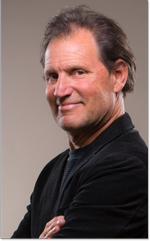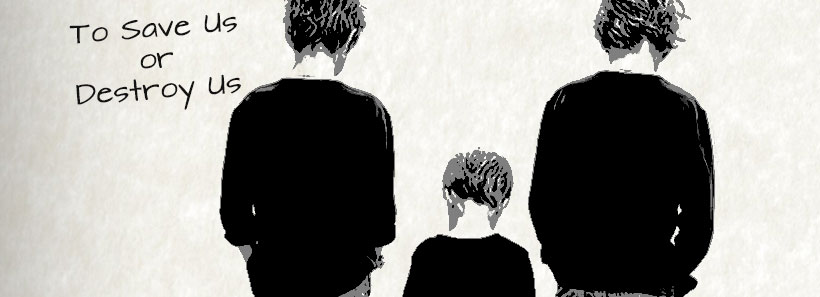
Bill English, Artistic Director
Three boys shared a bedroom in their family’s duplex. There wasn’t much room for anything but the three beds, arranged against three walls with a chest of drawers thrown in somehow on the fourth wall between the door to the hallway and the closet door. Two windows. The boys were 11, eight, and six, with no concept of what it would be like to have a room of their own. This was the nature of their universe and they never questioned it.
Their parents were products of the arid Western plains. Although both were college educated, they came from hardy pioneer stock, raised by generations of stoic farmers who had little use for emotion, and for whom physical affection was deemed a waste of time since it had little practical value. And they raised their boys by what they knew. Shake it off, be strong, study hard, achieve.
The six-year-old was crying in his bed one night. When the oldest brother asked what was wrong, the youngest said he didn’t think his Mom and Dad loved him. He remembers the oldest telling the youngest that he had gone to the bathroom one night recently and saw the parents’ light on under their bedroom door. He stopped to listen and heard them saying how much they loved their youngest boy; what a talented, smart son he was. He said this over and over till his youngest brother fell asleep.
Another night, the middle son woke feeling scared. Some gape-mouthed dream bear was after him. He said he was going to go to their parents’ room for a hug. He remembers the older brother discouraging the idea, saying, “You can go in there, but you won’t get a hug.” And when the middle boy came back from his expedition, he had to admit, “You’re right, they wouldn’t.”
These are the ways the middle and younger brothers remember these events. The older can remember neither, nor can he remember having such contradictory feelings about his parents. But as they look back, all three can see that the two younger brothers grew up and grew older with wildly divergent visions of their parents, almost as if they had grown up in different homes. And it is still impossible for all three to agree on the experience of their childhoods.
The stories we are told change us forever; form us, deliver us from evil, or resign us to failure. Lift us up or drag us down. They act on us at a level below reason. Beneath temporal truth. They live in our bones. Grimm’s Fairy Tales (designed to scare children into good behavior), Bible stories, Muslim stories, Buddhist stories (designed to perpetrate an all-male version of the divine), Hollywood blockbusters (designed to polarize us into good guys and bad guys, cowboys and Indians, evil Arabs and Germans).
These kinds of one-dimensional stories polarize us. They divide us into camps. And each camp preaches to the choir, telling stories that pat each other on the back, that make someone feel good at someone else’s expense. As if there was only one immutable truth. You’re either with us or against us. If we buy into simplistic truths, it saves us the trouble of actually examining the myriad complexities under the surface.
My youth with two brothers taught me that truth is not simple. Like Rashomon, like the plays of Pirandello, in this age of “fake news,” it is often nearly impossible to know where the truth lies. That is why we try to select plays for San Francisco Playhouse that present complex visions of situations in which it is very difficult to know which character’s version is true. Or is there “a” truth at all? These are the stories that keep us up late after performances debating our different takes on the narrative. “What should this character have done?” “Were this character’s actions justified?” “Which brother was telling the truth?” Or were both truthful?
We live in a complex world, and we ourselves are complex. Our choices are not easy. Our relationships, on a personal, social and international level, are often fraught with complexities, and we are constantly forced to make difficult decisions based on a multiplicity of factors. I want our art to reflect that complexity. Let’s tell stories that don’t present simple answers, or make it easy to take sides. Stories that reflect the myriad of truths that govern the difficult choices we all face. Multi-dimensional stories, not deluded with simplistic “good guy vs. bad guy” mythology, but stories where good and bad are inextricably intertwined, stories that challenge our skills at balancing contradiction, forming difficult analyses and making torturous decisions.

Bill
Latest posts by Bill English (see all)
- The 39 Steps: A Note from the Artistic Director - March 2024
- My Home on the Moon – A note from the Artistic Director - January 2024
- Guys and Dolls: A Note from the Artistic Director - November 2023




Bill, With your latest commentary (“To Save Us or Destroy Us”), you’ve expressed something important I’ve always trusted with my whole heart: where chaos and confusion rule, where love and loathing, wins and losses, victories and defeats light up the dark like birthday candles–well, turns out it’s not about good or bad, this way or that way. Wherever you turn, it’s always a mess. And (if you ask me) our best storytellers explore every murky, confusing corner of it. I love the way the Playhouse faces this bravely, without easy answers to difficult questions. It’s serious and fun at the same time.
Thanks, Nancy, and a very nicely written response!!
An exemplary observation which I shall pass on to friends.
A segue-perhaps related-as I aged questions about the “real” specifics of my family interactions and my parents views and beliefs needed clarification, alas it was no longer possible as they were not living. As a result I have urged my children to ask not only factual questions,but also about emotional responses and actions that in many ways determined who they became.
I do not believe there is one “truth”1 however having a referent base allows considerations and interpretations of memories from different vantage points.
I urge readers with whom your comments resonate to do oral histories, especially if they are fortunate to have generational access,or at a minimum ask questions. Without knowing the past, it is often more difficult to live in the present, and can make the future more formidable and in these uncertain times it may make a crucial differende.
Gae,
What a great comment. Such a great idea to get oral histories. I’m going to get to work on that with my still lucid 95-year old Mom.
Happy New Year!
Bill
Excellent as always, Bill.
A former classmate is seeing “Native Gardens” this weekend as part of her Orlando Shakes subscription. When I looked it up, I read that “Karen Zacarías is one of the most produced playwrights in the nation.” That’s when I realized I saw her “The Book Club Play” in Walnut Creek some years ago and am scheduled to see “Destiny of Desire” at OSF on St. Patrick’s Day. Are you and Susi looking at “Native Gardens” for us? It looks to have received positive reviews. Production History:
Cincinnati Playhouse in the Park, The Guthrie Theater, Arena Stage, Victory Gardens, Old Globe Theater, Denver Center for the Performing Arts, Trinity Repertory Theater, Orlando Shakespeare Theater, Intiman Theater, Florida Studio Stage, Vermont Stage, WaterTower Theater